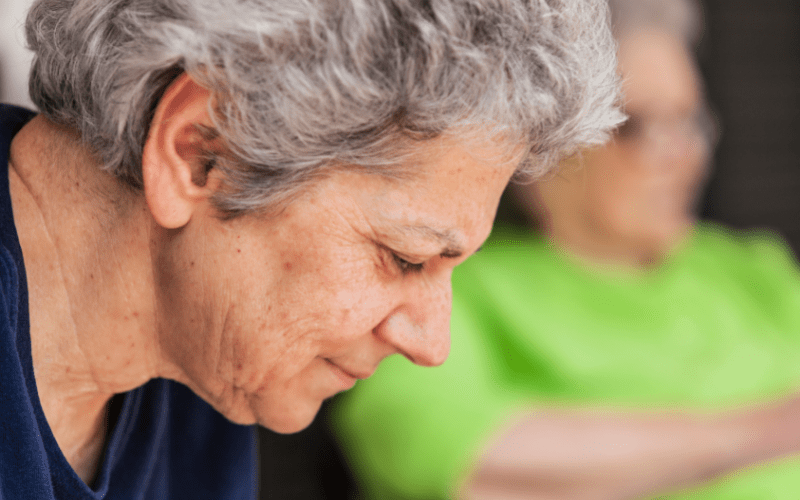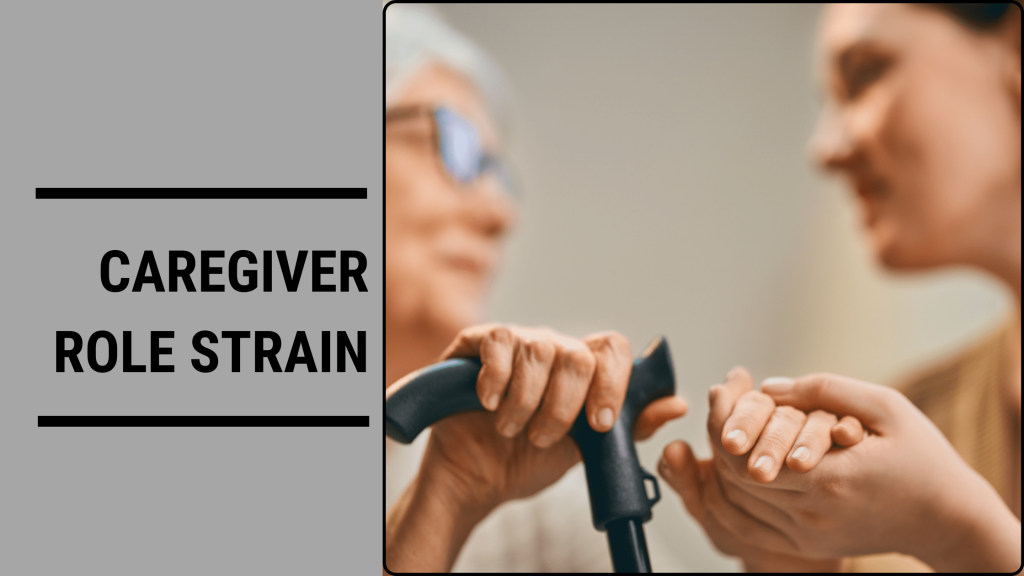Caregiver Role Strain: Signs And Preventative Steps
Do you constantly worry about how you will afford your loved one’s care? Have you ever been overcome with grief while caring for an aging parent who once cared for you? If so, you may already be familiar with caregiver role strain.
Caregiving can be immensely rewarding, especially for an aging parent, relative, spouse, or friend. However, it can be just as challenging — particularly when your responsibilities become overwhelming.
It’s understandable why you would want to assist someone you love, but it can take a toll on your wellbeing without the right systems and support.
Caregiver role strain can outweigh the benefits of caregiving and potentially lead to caregiver burnout. But by learning more about it, you can lower the risk of it happening to you. In turn, you’ll be able to keep providing the best care possible and maintain your quality of life.
What Is Caregiver Role Strain?
Caregiver role strain occurs when you feel you can no longer adequately carry out your responsibilities. This self-doubt can be brought on by several factors, including:
- Financial burdens
- Added responsibilities
- Family or role shifts
It often comes with feelings of overwhelm, stress, and anxiety. You might even feel guilty. However, caregiver role strain occurs frequently and is a normal reaction to challenging circumstances.
A Sign Of Caregiver Burnout
It’s easy to get so caught up in your responsibilities that you forget to care for yourself. However, chronically neglecting your needs can have serious health impacts that range from physical weakness to increased rates of illness.
And of course, all of that makes your job more difficult and stressful.
Long-term caregiver role strain can lead to caregiver stress and eventually cause caregiver burnout, which has far-reaching consequences like:
- Mood changes
- Increased feelings of frustration, anger, anxiety, and depression
- Permanent health conditions
- Shortened lifespan
Caregiver role strain, stress, and burnout share similar symptoms. When you learn the signs, you can take preventative steps to keep it from happening to you.

Signs Of Caregiver Role Strain
Most people who are responsible for someone else’s care and wellbeing experience stress. Not only is it a lot of work, but a lot rests on your shoulders. And of course, it usually requires that you make multiple lifestyle changes.
But caregiver role strain is more than the regular stress that comes from these responsibilities. It can cause you to feel lonely, angry, and guilty.
If you’re experiencing caregiver role strain, you may have the following symptoms:
- Insomnia or difficulty sleeping
- Excessive sleep
- Chronic fatigue
- Irritability
- Social withdrawal
- Diminished self-worth
- Concentration problems
- Appetite changes
- Weight gain or weight loss
- Lower sex drive
- Less interest in hobbies
- Frequent bouts of crying
- Frequent headaches or body pains
- Unhealthy coping methods such as alcohol or drug abuse
This list is not exhaustive. Moreover, many of these symptoms overlap with depression, which also typically occurs with caregiver role strain. This can worsen preexisting depression symptoms and severely jeopardize your overall health.
So if you experience any of these symptoms, you should discuss them with your doctor or mental health professional. Together, you can find healthy ways to manage your symptoms, such as medication, therapy, holistic remedies, or another treatment option.
Causes Of Caregiver Role Strain

Financial Burdens
Besides administering care, family caregivers frequently have significant financial responsibilities, too.
According to AARP, annual out-of-pocket caregiving-related costs can cost an average of $6,954 — or 20% of a family’s yearly income. So it’s no wonder that many caregivers cut spending on hobbies, vacations, or other leisure activities, which only raises the likelihood of caregiver role strain.
Added Responsibilities
When you step up to care for a loved one, you take on a lot more responsibilities — some of which you may not be aware of until you’re firmly in your role.
And if you’re one of the almost 60% of caregivers who also work full-time, these added duties can be particularly difficult to manage, further putting you at risk of caregiver role strain.
Other than assisting with everyday care and activities, you are often responsible for tasks such as:
- Tracking your loved one’s health
- Communicating with their care team
- Finding and scheduling miscellaneous services
All of these increase your burden and, ultimately, stress.
Family Or Role Shifts
Disruptions, changes, or general shifts in your family or role can also cause caregiver role strain. Caring for somebody who once cared for you isn’t just stressful; it can also trigger sadness or confusion.
Unrealistic Expectations
When you care for somebody else, you might believe that your support will positively impact the other person’s wellbeing. But unfortunately, this isn’t always the case, especially if your loved one has dementia, Parkinson’s, or another progressive disease.
When these unrealistic expectations aren’t met, you could start to doubt your abilities, which leads to caregiver role strain.
Inadequate Support
A strong support system lays the foundation for an improved quality of life for both you and your loved one. Having other people you can turn to for help makes it easier to manage stress and other areas of your life.
Without anyone to support you, your risk of caregiver role strain can increase significantly.
Insufficient Training
Regardless of the degree of care your loved one needs, caregiving requires certain skills that not everyone has.
The right skills can help you lower your stress and frustrations, particularly when it comes to efficiently planning, managing, and organizing your loved one’s care.
While you don’t have to take a full-blown caregiver certification course to learn these skills, some background knowledge can go a long way to easing caregiver role strain.
Social Withdrawal
Caregiving can be all-consuming, leaving you with little time for yourself. When you don’t have a support system or an opportunity to rest and recharge, your interpersonal relationships can also suffer. Isolation and loneliness can compound depressive symptoms, creating a cycle that’s hard to escape.
Self-Neglect
Keeping your energy levels up by maintaining a healthy diet, exercising regularly, or getting quality sleep can be hard to do when you feel like you barely have time for yourself. However, letting your personal care go by the wayside only exacerbates the symptoms of caregiver role strain.

Risk Factors
Other than the common causes of cause caregiver role strain, several risk factors can increase your risk, such as:
- Being a woman: Caregiver role strain often occurs more in women than men because they are often responsible for more intensive care, whereas men generally carry out less emotional activities such as home projects or bill pay.
- Living in the same home as the care recipient: Studies find that caregivers who live with the care recipient spend twice as much time providing care than those who live separately.
- Caring for a spouse: If you provide care for a spouse, you may experience a long-term drop in your health, which increases your chances of caregiver stress.
- Lack of choice in your role: Caregiving isn’t always a choice. You might be the only person who can provide care, live closest to your loved one, or are the most suited for the job. This situation can leave you feeling frustrated and resentful, putting you more at risk.
- Being a young caregiver: Young caregivers are more vulnerable to stress when a familial or role change occurs.
- Caring for someone with a progressive disease: Alzheimer’s, dementia, Parkinson’s, and other types of progressive diseases require a high degree of specialized care that few family caregivers are trained to give. And as safety concerns become greater, so can the possibility of caregiver role strain.
- You are part of the “sandwhich generation”: Members of the sandwich generation are stuck between the needs of their aging parents and those of their own children, adding more stress to your life.
How To Avoid Caregiver Role Strain
While the stress of caregiving is unavoidable, the following ideas may help reduce your risk of caregiver role strain.
Care For Yourself
Caregiving may demand most of your time, but you shouldn’t forget about your own needs. When you care for yourself, you have the energy, focus, patience, and more to be a better caregiver. That means:
- Exercising regularly
- Getting enough sleep
- Eating right
- Avoiding alcohol and drugs
But besides that, you may try eating with your loved one as a bonding experience. It’s also important that you find reasons to laugh each day, work on your hobbies, and visit friends. All of these ensure you feel like yourself rather than your loved one’s caretaker.
Exercise With Your Loved One
Working out together is another great way to bond with your loved one. Besides, exercise isn’t only important for you — it’s just as crucial for your aging parent. There are many indoor exercises for seniors to promote balance and muscular strength. Physical activity can lower depressive symptoms, uplift your spirits, and give you more energy.
Be Mindful Of Your Feelings
Losing your patience isn’t uncommon when you are a caregiver. However, you should take steps to avoid this situation by being aware of your feelings. So if you feel your frustration mounting, be mindful of it and give yourself a short break to step away from the situation.

Get Organized
Learning how to be an organized caregiver can be tough, but creating and following a schedule will make your job much easier. It helps to have a calendar, budget, meal list, grocery list, and various passwords all in one place.
Record everything you need to do during the day, but give yourself room for some flexibility. Rank your tasks by their importance, and don’t be hard on yourself if you don’t get to everything by the end of the day. These notes are merely an outline that can give you some direction and control over your day.
Find Support
If you don’t have a support system in place already, building one should be a priority. Whether you need someone to assist with part-time care or just to talk to, it’s important that you have that.
A strong support system can reduce your risk of social isolation and allow you to express your feelings. When people hear your experiences, they may give you relevant resources or even hands-on help.
Set Realistic Expectations
You can only do so much as a family caregiver, so you shouldn’t beat yourself up if you can’t solve everything. Be mindful of what you can do for your loved one and what you can’t. For example, you might be able to prepare weekly meals, take a walk, or help with personal care, but not injections or ambulation. Don’t push yourself too hard, and remember that you’re doing the best you can.
Consider Respite Care
If you can afford it, respite care is a valuable resource for family caregivers. With respite care, a professional in-home care worker can assist with medical needs, companionship, housework, transportation, and more.
Adult day care is another option that may be more affordable. Some facilities provide temporary or short-term stays so you can take a break from your role and return revitalized.
Get Assistance From Your Employer
Caregiver role strain is much more likely to occur if you work full-time. However, if you are eligible for the Family and Medical Leave Act, you could qualify for 12 weeks of unpaid leave per year to care for your loved one. To find out more, ask your company’s HR department about employer benefits for caregivers.
Communicate With Your Loved One
When you care for an aging parent, spouse, or friend, the last thing you want is for your responsibilities to impact your relationship. Make sure to have frequent talks about your role, one another’s feelings, and make time for activities you both enjoy. Doing things to strengthen your bond will emphasize the benefits of caregiving rather than the burden.
Avoid Caregiver Role Strain With MeetCaregivers
Many family caregivers experience caregiver role strain. If you feel any of the symptoms apply to you, it’s vital that you get help before it leads to caregiver burnout.
Ask us about respite care options, part-time caregiving, transportation assistance, meal delivery, and more. Call 1 (888) 541-1136 or reach out online. We’re here to help!
For more resources, visit our Blog.
Sources
- CaringBridge Staff. “10 Tips to Prevent Caregiver Role Strain.” CaringBridge, 27 Oct. 2020, www.caringbridge.org/resources/caregiver-role-strain/.
- Stringfellow, Angela. What Is Caregiver Role Strain?, 18 Sept. 2018, www.seniorlink.com/blog/what-is-caregiver-role-strain.
- “What Is Caregiver Strain and How to Avoid It.” FreedomCare NY – A CDPAP Agency – Hire Family As Paid Caregiver, 16 Sept. 2020, www.freedomcareny.com/posts/caregiver-role-strain.

